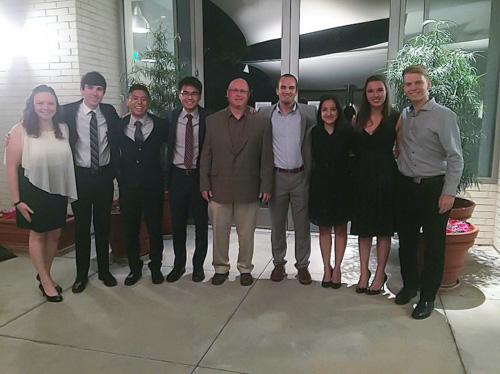Many students feel apathetic toward voting in the upcoming presidential election, especially because of the radically different candidates on the ballot. A recent survey done by the Chimes found that a large portion of students feel either unsure or unwilling to vote in the 2016 presidential election.
Lack of Shared Values
Darren Guerra, political science professor at Biola University, encounters students who simply do not want to vote for any of the candidates. The reason being, students have difficulty finding a candidate that shares their same values.
Some students, such as Peter Rothermel VI, a sophomore broadcast journalism and political science double major, explore an alternative to frontrunners Donald Trump and Hillary Clinton by considering libertarian party candidates. Because he can relate to the millennial generation’s dissatisfaction with the polarized parties, Rothermel considers voting for libertarian candidate Austin Petersen. Petersen’s pro-life and fiscal-conservative stances align with Rothermel’s own.
“I’d say that [young people] are not necessarily done with the two-party system, but they’re done with kind of the generic candidates that we always get that we feel like we can’t trust, but feel like that’s all we have,” Rothermel said. “I’m looking for something, someone that can bring in both sides, and actually find compromise but not have to sacrifice my principles.”
Campaign Drama
According to Guerra, it is a tough election year for Christians. Students can easily get caught up in the drama of catchy campaign slogans and big personalities.
“It’s not a secret. Donald Trump has driven his campaign on being eye-catching, saying provocative things,” Guerra said.
Meanwhile, public policy issues have been further from the surface of the political discussion.
Clubs like Biola’s chapter of the American Enterprise Institute help students think about public policy. AEI, a think tank based in Washington, D.C. devoted to researching public policy, hosts speakers and events to educate students about public policy issues.
It can be difficult for some first-time voters to identify how public policy connects to elections, according to Hailey Braun, a sophomore political science major and member of the Biola chapter of the AEI.
“I think a lot of people don’t realize that the things that they’re interested in are public policy … Maybe they don’t know quite what public policy is,” Braun said.
In fact, public policy greatly impacts people’s everyday lives. According to Guerra, voters would be wise to consider candidates’ policy stances, rather than merely their eye-catching veneers.
“I would define public policy as any kind of public enactments, whether it’s laws, or regulations, or even approaches to issues that impact our daily lives,” Guerra said. “We’re deciding [who to vote for based] on personality, but the impact’s going to be in the policy realm,” Guerra said.
Because of the checks and balances of the political system, the president does not have all the power to do whatever he or she wants. He or she has to negotiate with the House of Representatives and the Senate. However, lately Americans have seen a lot of policy created by the Supreme Court.
“The real power in Washington right now is the Supreme Court, where they’re the ones both legislating and executing the law. Instead of their original role [which] was just to interpret exactly what the constitution says,” Rothermel said. “But there’s been a breakdown of that.”
Justice Antonin Scalia’s untimely passing leaves an empty seat on the Supreme Court bench. It will be up to the next president to fill it. There is potential for more seats to open up if justices retire.
Rothermel is taking this reality into account as he makes his decision of who to vote for this fall. Guerra agrees this should be a consideration when deciding who to vote for.
“If you want judges making policy, you should vote for someone on the left. If you don’t want judges making policy, then you shouldn’t,” Guerra said. “And you know, judges aren’t elected, they aren’t electorally accountable, and they serve for life. So they’re a little insulated from public opinion.”
Possibility of a Third Candidate
Still, Guerra remains unsure of how he will vote this fall. He has heard valid arguments for settling for the lesser of two evils and voting for a frontrunner. Still, he does not discount the possibility of a third candidate entering the race. A third candidate may arise to aid with voter turnout, which helps the whole ballot.
“It’s not only presidents who we’re electing. We’re electing senators and members of congress and mayors and governors, and if people that are frustrated with the Trump candidacy just stay home, that hurts the entire down-the-line ticket,” Guerra said.
Christians’ Civic Duty
No matter who they vote for, it is important for Christians to vote because it is their civic duty.
“Christians do have a responsibility to vote, even if you don’t have an option you’re excited about. I think that’s a basic kind of civic responsibility, and one of the ways we love our neighbor is through politics by promoting public policy that creates an environment that people want to live in and creates a safe environment for people,” Guerra said.
Furthermore, Guerra advises students not to opt out of voting because they are frustrated with the candidates. Instead, he encourages them to keep a theological perspective when voting.
“I would remind [students] that the theological virtues are faith, hope and love, and it’s important to cultivate hope,” Guerra said.







